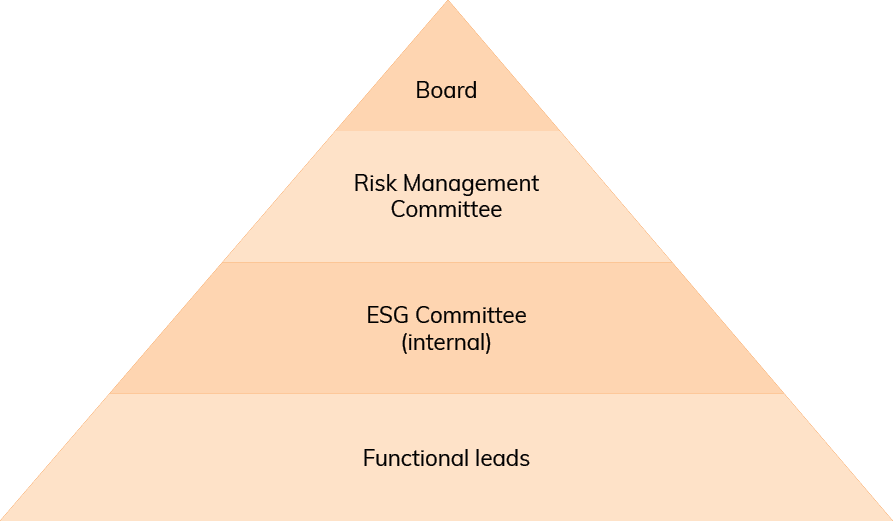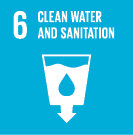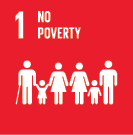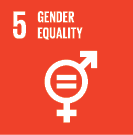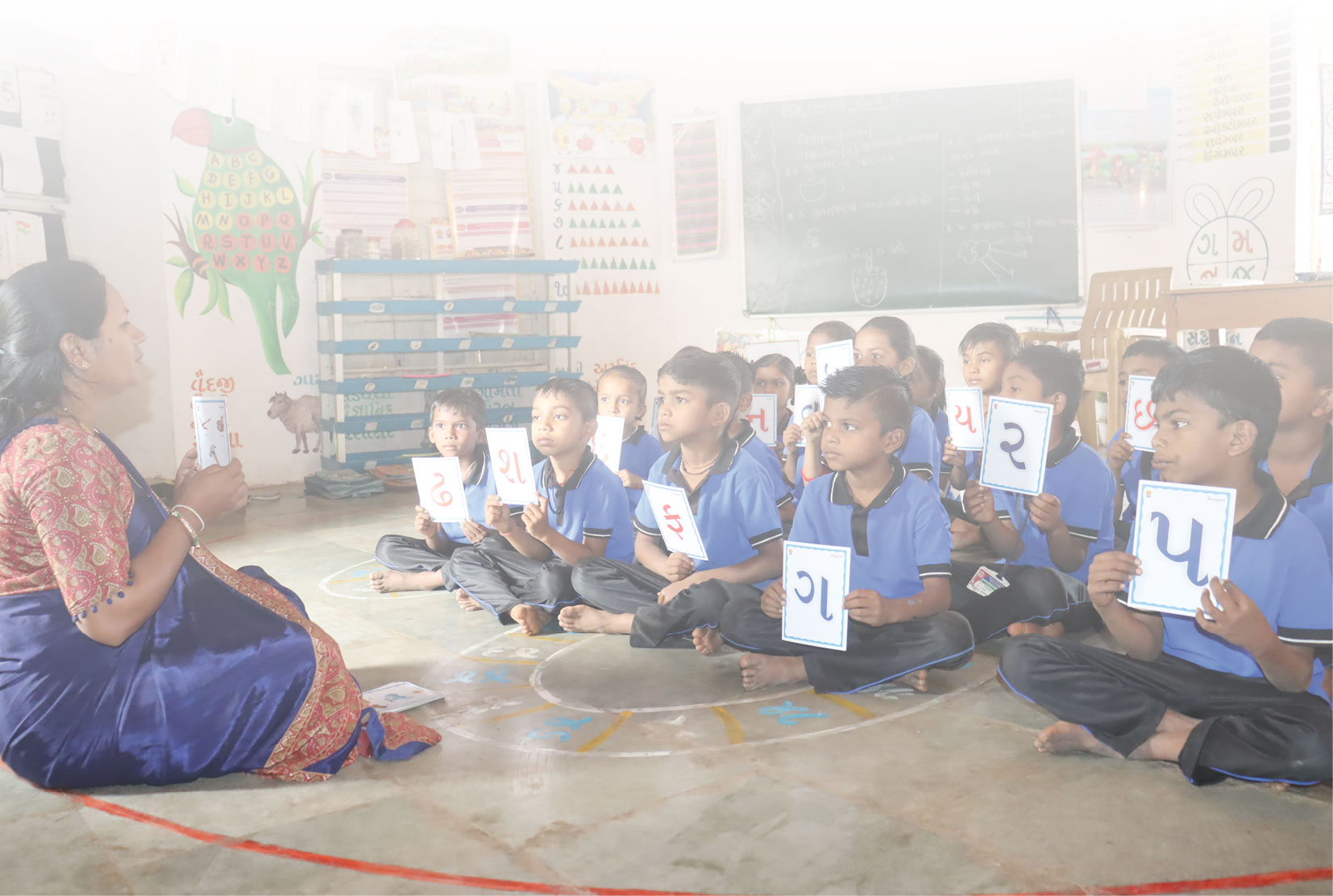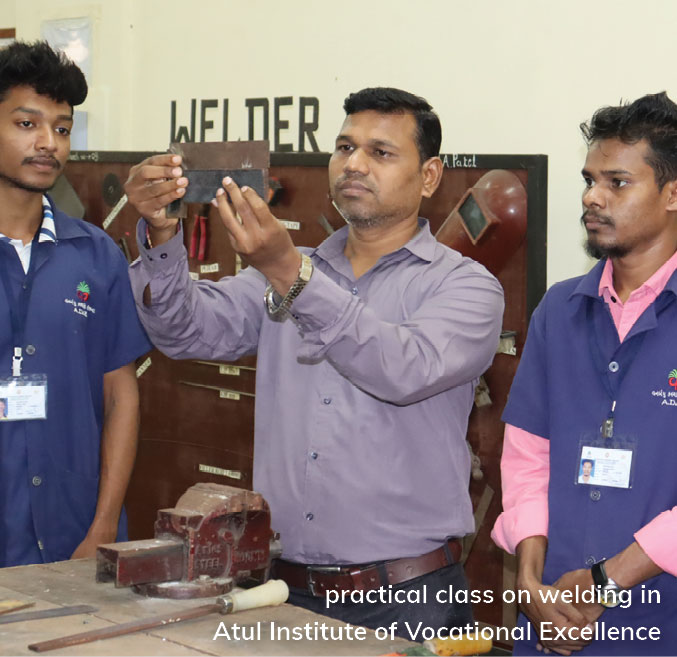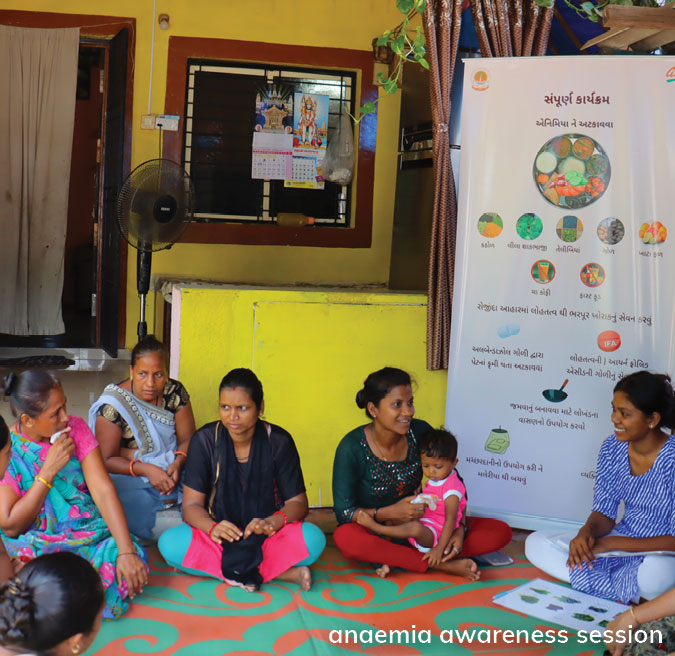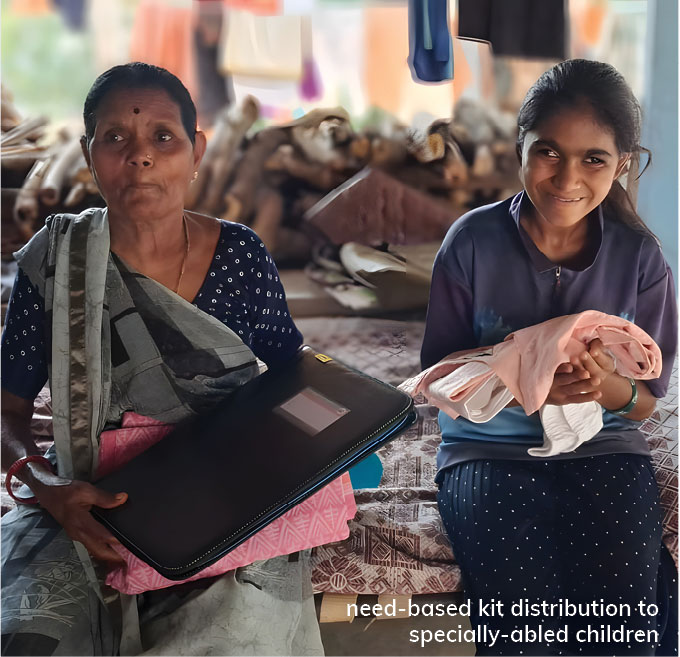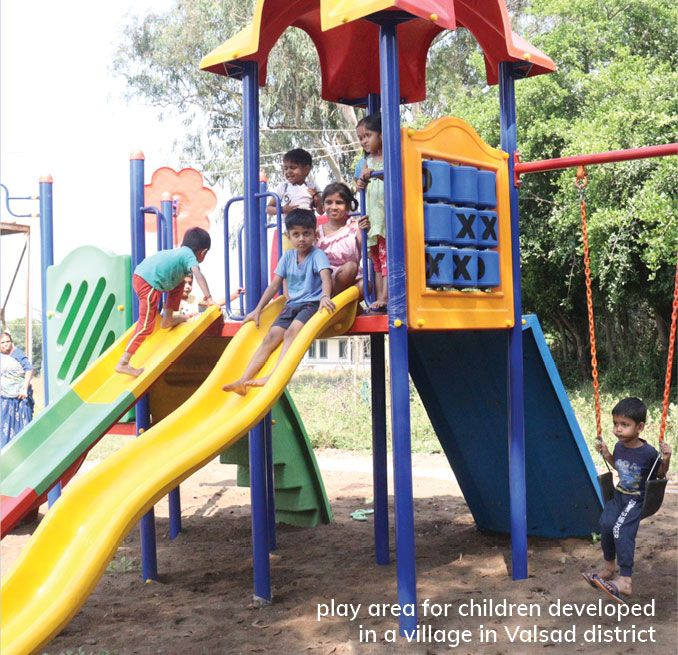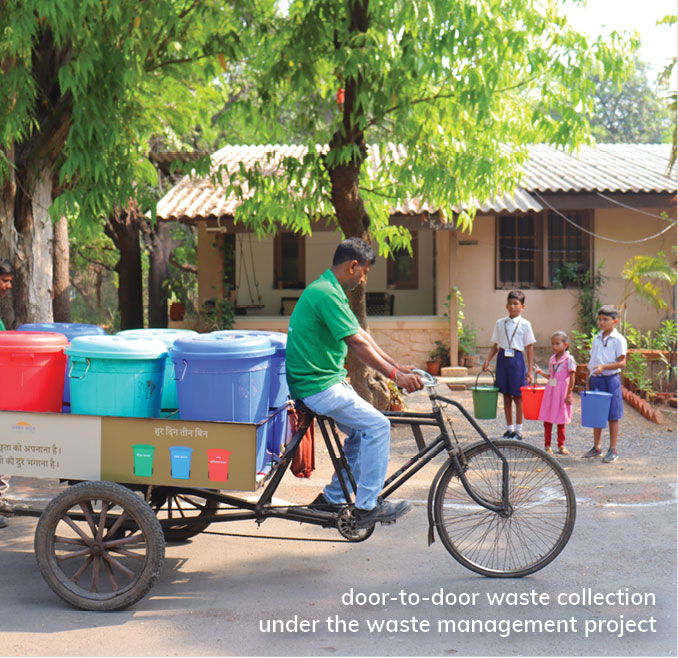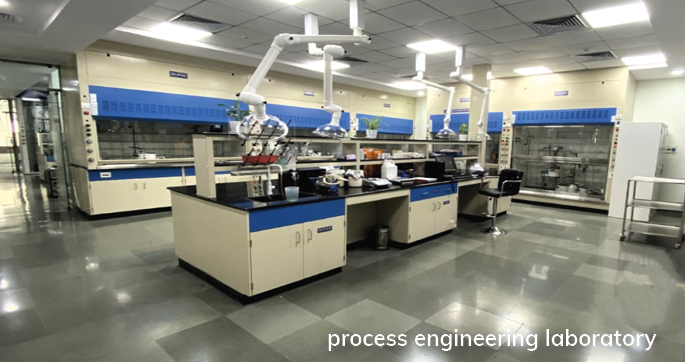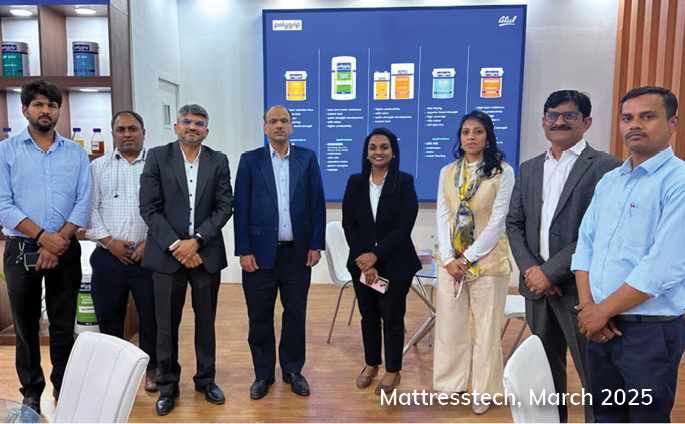ESG action report
Our Company is committed to embedding environmental, social and governance (ESG) principles into its business operations. Sustainability has always been a core focus and we view ESG as the key driver of long-term stakeholder value and a means to improve the quality of life in the communities we serve. Materiality is central to the business strategy of our Company and thus through structured stakeholder engagement, we identify and prioritise ESG issues material to the business and ecosystem. This section offers a comprehensive overview of the ESG commitments, actions and their impacts.
ESG framework
We have integrated environment, social and governance (ESG) framework into the business strategy of our Company based on the belief that ESG and financial performance make a business sustainable. We are continually working towards the ESG and financial objectives to make a positive difference to all the stakeholders. We constituted an internal ESG Committee in May 2023 to oversee the governance of ESG practices and ESG risks, thereby ensuring that the ESG agenda gets the requisite attention and resources of the Management.
Environmental
Our Company has been sensitive to the environment since its inception. The natural forest created at the first site makes it one of the greenest chemical complexes of its kind in the world. The environmental commitments undertaken, focus on manufacturing responsible products and addressing their environmental impact throughout their life cycles. These impacts include climate change, resource use (energy and water), waste management and nature conservation. We are committed to creating a sustainable and equitable future for all, striving to achieve a balance between financial value and environmental stewardship.
SDGs impacted
| Sustainability area |
|
||||||||||||||||||||
|---|---|---|---|---|---|---|---|---|---|---|---|---|---|---|---|---|---|---|---|---|---|
| Climate change performance |
|
||||||||||||||||||||
| Energy performance |
|
||||||||||||||||||||
| Water management |
|
||||||||||||||||||||
| Waste generated and disposed |
|
||||||||||||||||||||
| Raw material consumption* |
|
||||||||||||||||||||
| Air emissions |
|
||||||||||||||||||||
*consolidated basis
Mitigating climate change and reducing greenhouse gas emissions
We are aware of the growing risks of climate change and recognise the need to mitigate its challenges by reducing greenhouse emissions, adopting sustainable practices across the operations and remaining committed to reducing the carbon footprint through ongoing initiatives.
- Achieved a 25% reduction in steam usage by optimising unit operations and a 29% reduction in power consumption by enhancing utility and operational efficiency in a plant thus reducing the carbon footprint.
- Reduced PNG consumption in a plant by 64%.
- Used 70 TPD steam generated from process heat in a plant and recovered 100 TPD of steam from distillation operations, reducing the use of carbon fuel in production.
SDGs impacted
Conserving water through responsible water management
We are committed to managing water responsibly through efficient usage, recycling and various conservation initiatives.
- Achieved a reduction of 10.74 kL/MT in freshwater consumption during the manufacturing of a product by recycling wastewater.
- Attained a 23% reduction in water consumption in a plant by recycling multi-effect evaporator condensate and vacuum belt filter wash water in process.
- Optimised water consumption by improving the washing process in the manufacturing of select products and recycling condensate water in others.
SDG impacted
Managing pollutants
We effectively managed pollutants through reduction, recycling and reuse, ensuring compliance with sustainability standards and promoting a circular economy.
- Achieved a 20% reduction in solid waste disposal by eliminating the use of Hyflow in filtration process during the manufacturing of a product.
- Introduced process improvement in a few products to decrease generation of pollutants and recovered a product for reuse.
- Optimised raw material usage in a few products, resulting in reduced liquid effluent generation.
SDG impacted
Energy management and energy efficiency
We focused on optimising energy use by enhancing efficiency, adopting renewable sources and implementing decarbonisation plans.
- Increased hybrid power (solar + wind) capacity from 3.96 MW to 6.86 MW and installed a 300 kW solar rooftop at the plant premises, which is expected to generate 4.33 lakh kWh of renewable power annually.
- Replaced pressure reducing desuperheater stations with energy-conserving turbines of 250 kW and 315 kW capacities, improving efficiency and saving 10.56 lakh kWh of power.
- Used an energy-efficient motor for demineralised water transfer pump in a power plant, saving 16,800 kWh of power per year, and installed 500 kW HT variable frequency drives for boiler feed pumps at two power plants, saving 1.38 lakh kWh per year.
SDGs impacted
Biodiversity and its conservation
The green zones, which constitute a significant portion of the Atul and Ankleshwar sites, provide a nurturing habitat for various species of flora and fauna, including indigenous species as well as several migratory birds. A comprehensive biodiversity study of Atul site identified about 330 plant species and 136 faunal species. We take responsible steps to protect the vast flora and fauna diversity in Atul.
SDGs impacted
 Common Kingfisher
Common Kingfisher
Governance
Transparent and ethical governance forms the foundation of the business strategy and shapes the organisational culture with strong corporate governance practices. It ensures that ESG commitments are integrated into the decision-making, fostering transparency, accountability and ethical leadership. By embedding governance at the core of ESG initiatives, we aim to enhance trust, strengthen resilience and contribute to sustainable growth. This section explores the governance structures, policies and frameworks that guide responsible business practices, mitigate risks and drive long-term value creation.
SDGs impacted
Innovation and technology
We believe in continuous improvement with a focus on innovation in everything we do. The R&D team is dedicated to developing new products and innovating processes, while the Technology team continuously enhances its methods and adopts advanced technologies to achieve the sustainability goals of our Company.
- Commissioned 14 new products
- Improved the yield of 29 products
- Debottlenecked one product
SDGs impacted
Process and chemical safety
We prioritise process and chemical safety right from the product development stage. This begins with the careful selection of synthesis route, minimisation of toxic and hazardous solvents and reagents, reduction of hazardous waste generation and the use of process intensification tools to miniaturise equipment sizes for safer operation. The state-of-the-art process safety laboratory is fully equipped to study all aspects of process safety, supporting key objectives such as process intensification, emission and effluent reduction and plant footprint minimisation. Every process is thoroughly evaluated by the process safety team before being scaled-up.
SDGs impacted
Quality assurance
We aim to create paperless laboratories by implementing various digital solutions, including in-process sample applications, digital document management system and quality management system modules. Techniques like spectroscopy and chromatography deliver consistent results with minimal sample preparation and processing. Additionally, the shift towards reduced testing aims to eliminate redundant checks without compromising product quality. By identifying critical control points and focusing testing efforts accordingly, we aim to deliver consistent quality as well as conserve resources such as energy, materials and time.
SDGs impacted
Product stewardship
We are committed to incorporating product stewardship into every aspect of the product development process. This involves: product identification, laboratory development, validation, scaling up at pilot and plant levels and ultimately, commercialisation. The primary focus is on developing products and processes with minimal environmental and social impact.
- Developed six products | formulations which have zero waste generation
- Performed product carbon footprint evaluations for 12 products.
- The membership of responsible care further reinforces the commitment to delivering sustainable products to the customers.
SDGs impacted
Digitalisation
We are in the process of establishing a secure and resilient operational technology network to leverage artificial intelligence, machine learning and internet of things technologies to improve manufacturing processes.
- Arranged organisational data in a unified data layer and enabled tableau visualisation to generate insights for data-driven decision-making across businesses and functions.
- Generated savings through analytics on manufacturing process data.
- Introduced industrial internet of things-based health monitoring of critical equipment to avoid breakdown.
SDGs impacted
Marketing and customer relations
We prioritise customer satisfaction by delivering sustainable products and services of high quality and build long-term partnerships by understanding and addressing customer needs.
- Added 188 new B2B customers and 465 new B2C customers
- Commenced sales in one new geography
- Conducted customer satisfaction survey and took corrective actions based on the feedback received.
SDGs impacted
Logistics and supply chain
Through collaboration with suppliers, the adoption of sustainable practices, optimisation of transportation, reduction of emissions and promotion of responsible sourcing, we strive to minimise the impact on environment, build a responsible and resilient supply chain and contribute to a socially responsible business ecosystem.
- Adopted multi-modal transport by shifting import clearance operations to inland container depot via cargo rail, resulting in a 7.04 kg CO2 reduction per metric ton transported and a 77% decrease in transport-related emissions.
- Increased ISO 20400 certification coverage from 57% to 70% of the total spend. The ISO 20400-aligned procurement strategy helps in mitigating environmental risks, enhancing brand reputation and optimising supply chain resilience.
- Introduced intermediate bulk containers (IBCs) that are 5 cm shorter than the previous design, increasing container capacity from 18 to 20 IBCs per 20 ft container. This enhancement improved space utilisation, optimised logistics and significantly reduced transport-related emissions.
SDGs impacted
Information security and data privacy
We have a robust Information Security Policy in place and well-defined processes to ensure the confidentiality, integrity and availability of digital information.
- Initiated information security operations center
- Developed multifactor authentication for network security
- Identified vulnerable users through a phishing simulation software and offered awareness training to them
SDG impacted
Governance philosophy
The name 'Atul' is a unique asset, which represents a rich heritage of Values. In an environment where change is a way of life, continuity of Values provides stability and is fundamental to us. We have therefore formalised key Values and are committed to institutionalising them. We will seek to create an environment wherein these Values are consistently practised and nurtured and ensure that they are not compromised.
Values
Integrity
Working with honesty, following the highest standards of professionalism. Integrity is when our decisions and actions remain consistent with our thoughts and words, written or spoken.
Understanding
How well we work with others depends on our ways to connect and this in turn is based on our level of understanding of human relationships. This certainly does not mean that we accept poor performance, but that we do it the right way. Understanding is the external manifestation of internal realisation.
Unity
Working together and taking advantage of synergy while harnessing unique abilities of each of us to achieve a larger goal. Unity is the realisation that though we may work in different areas, we are finally interconnected, and that interdependence is a higher order of living than independence. Though we may be many, we share a common purpose.
Responsibility
Delivering value and taking ownership of actions. Responsibility must also give us the realisation that what is good for the business must be in the overall good. In essence, we must work with a spirit of trusteeship for the shareholders and other stakeholders. What comes to us must be returned many times over.
Excellence
A drive that is more from inside than outside; it is about us seeking to continuously improve and develop an eye for innovation even in day-to-day work. Excellence is about excelling in everything we do and not giving up. Excellence is also a journey, not simply a destination.
As team members of a responsible corporate entity, we remain steadfast in the commitment to enhancing the governance framework to foster accountability and transparency. The proactive efforts are to instil Values across our Company and endeavouring for sustained excellence in all that we undertake to create long-term value for the stakeholders.
Stakeholders
- Consumers
- Customers
- Team members
- Suppliers and business partners
- Planet
- Government
- Society
- Shareholders
Governance structure
The governance structure of our Company is multi-tiered, comprising the Board of Directors, Board Committees, CEO and the Management Committee.
The Board is responsible for and committed to the principles of corporate governance in our Company. It discharges some of its responsibilities directly and others through the Board Committees. In addition to the Board Committees, the Board is supported by the CEO and Executive Directors.
Board of Directors
Board Committees
| Audit Committee | Corporate Social Responsibility Committee | Investment Committee | Nomination and Remuneration Committee | Risk Management Committee | Stakeholders Relationship Committee |
CEO, Executive Directors and Management Committee
Board oversight
Management accountability

